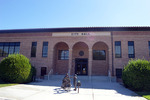City’s land management plan not immune to voters
At the Oct. 25 City Council meeting, Councilman Cam Walker and Mayor Rod Woodbury debated for almost two hours on the purpose of the land management plan.
A proposal by developer Randy Schams for a potential trade of 900 acres of city land for 650 acres owned by Schams in Eldorado Valley sparked the debate.
Schams said that he proposed 900 acres in unincorporated Clark County as a way to start a discussion about a potential trade and he did not expect to receive all the acres.
Walker said that he did not think the offer was serious enough to warrant a spot on the land management plan.
Woodbury disagreed, saying that it did not matter if Schams proposed 900 acres since it served as a way to start a discussion about the potential uses of city-owned land.
The two were unable to come to an agreement leading to the unanswered question of what is the land management plan? And does it have the power to dictate how city land can be used?
Creating a template
The land management plan was created in 2001 as a way for the city to map out potential uses of city-owned land.
The plan would allow the city, businesses and residents to propose different projects that they want to see completed on different parcels in Boulder City.
“The ordinance was originally passed to start a discussion,” said Brok Armantrout, director of community development. “It was an opportunity for people to propose what they thought the best use of the land was.”
In short, the land management plan was a created as a way to create proposals for city land use and just because a project was proposed does not mean the city has to act on it.
In fact, more than half of the 44 proposals listed on the land management plan have never been acted on.
For example, the city has land on Industrial Road listed on the land management plan since its inception and the city has not acted on any proposal regarding that land. Armantrout said that the city has not done anything with that land because either the timing was not right to bring a proposal forward or the entities that originally proposed a use for the land have lost interest.
“We have had parcels on Industrial on the land management plan since 2001 and that land still not been used,” Armantrout said. “Sometimes it was not the right time to use that land and other times the ones interested in that land have lost interest.
If something is on the land management plan it does not mean we have to use it for that purpose. It just means that we wanted to discuss the proposal as a potential use.”
The process to propose a bid be put on the plan is a multistep one. It begins in September when the city begins a 30-day discovery phase, which allows outside parties and the city to propose ways in which the land can be used. The process is not exclusive to Boulder City residents; anyone can submit a proposal.
After the discovery phase, the proposals are sent to the Planning Commission in November where it will give its recommendations.
“The Planning Commission gets all the potential bids and gives us recommendations on what (commissioners) think of the proposals and how it should be zoned,” Armantrout said.
The proposals are then brought to City Council for a vote. The council usually votes on additions to the land management plan in December; however, it is not required to vote on the plan until February.
According to Armantrout, a December vote is simply a way to speed up the process.
After the council votes, proposals are put in the land management plan where they will be studied and discussed by residents at several workshops.
No dates for land management plan workshops have been set, but the city is hoping to have the first one in mid-January.
Toothless tiger
When Schams proposed a trade for 900 acres, many residents at the council meeting said that his proposal was a way to circumvent voters by allowing the city to avoid a resident vote on city land sales as required by the Boulder City Charter.
Residents felt that if the City Council simply traded the land to Schams, then it would not require permission from voters, but this sentiment is counter to city law.
The land management plan does not have the power to choose how city land will be sold or used. It only can propose a designation.
“Placement on the land management plan is just one out of a hundred steps,” Armantrout said.
Schams can propose a trade or sale of city land, but the voters would still have to approve any sale or trade, Armantrout said.
“Just because something is on the land management plan does not mean it negates our requirement to bring it to voters,” Finance Director Hyun Kim said. “I think there is a silver lining in all this because Schams proposal has brought so much interest that we can finally have a real discussion about how we should use city land.”
The powerlessness of the land management plan means that any effort to circumvent voters with a land swap would have to go to the voters since the City Council does not have the ability to vote on a trade.
Land leased by the city only requires a council vote. However, Schams is looking to own land in Boulder City, not lease it.
The land management plan also has no effect on the city’s growth ordinance.
The growth ordinance only applies to residential land and while Schams proposal for the land management plan is meant for his residential Boulder Highlands project, the land management plan can not officially give city land a residential designation. That could only occur if the land sale was approved by voters and would then be subject to the city’s growth ordinance.
“The growth ordinance only deals with residential areas and the land management plan does not have the power to designate,” City Manager David Fraser said. “The land management plan is an entirely different creature from the growth ordinance.”
For more information on the city’s land management plan, visit the city’s website at www.bcnv.org/465/Land-Management-Plan.
Contact reporter Max Lancaster at mlancaster@bouldercityreview.com or at 702-586-9401. Follow him on Twitter @MLancasterBCR.















